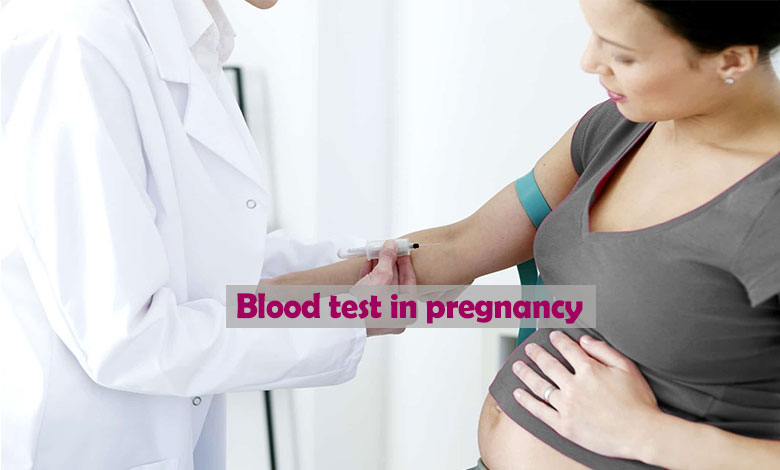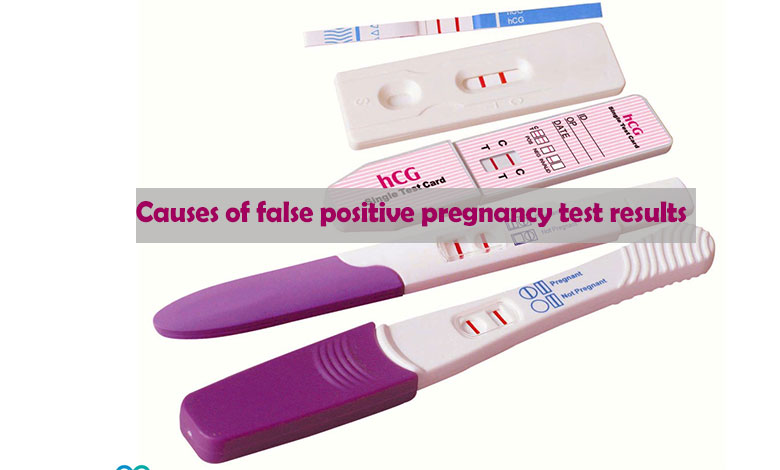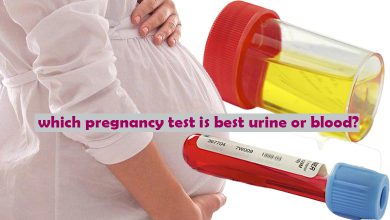What is a pregnancy test? Types and reasons of false positive pregnancy test

The pregnancy test is one of the most exciting lab tests for all women. The pregnancy test can be done at home or in a laboratory. To know whether you are pregnant or not, you can use a blood pregnancy test or a urine pregnancy test.
If you take a pregnancy test at the right time, both methods will give you reliable results. Reading our article will help you know when is the best time to take a pregnancy test and, at the same time, you will know when you might get a false positive result.
Related posts: the symptom of skin hives during pregnancy
Types of pregnancy tests
There are different types of pregnancy tests. Each of these tests has its positive and negative points, and the probability of its accuracy is not necessarily 100%. On the first day after your cessation of menstruation, pregnancy test results are most accurate. Of course, it is better to wait at least a week after the cessation of menstruation so that the test results are accompanied by the least number of errors.
The pregnancy test is done through blood and urine samples. home pregnancy test
Home pregnancy tests (HPT)
In the home, pregnancy tests the level of human chorionic gonadotropin (HCG) in the urine is checked. This hormone can only be measured during pregnancy.
The chemical on the test strip changes color after exposure to this hormone. The waiting time varies depending on the type of test. You have to wait about 10 minutes for the answer to the home pregnancy test.
To be more sure, it is recommended that you do the home pregnancy test at least twice. Taking a pregnancy test sooner or later can lead to wrong results.
Urinalysis
You can do a urine pregnancy test at medical centers. The accuracy of this pregnancy test is the same as a home pregnancy test. For the test to be associated with the fewest errors, you may want to check with your doctor when to send the sample.
The best example is morning urine, which may have the highest concentration of the HCG hormone. You do not need to fast to perform this test.
Blood test in pregnancy
You should take a pregnancy blood test in medical centers. A medical diagnostic laboratory measures the HCG hormone status by taking a blood test. You can take a pregnancy test at home or at a place of your choice using the hospital’s laboratory services.

Blood tests to determine pregnancy is divided into two main types:
- Qualitative HCG Blood Test – The purpose of this test is to check the level of HCG production in the body. This gives you a simple yes or no answer as to whether the person is pregnant.
- Quantitative HCG blood test: The purpose of this test is to accurately determine the amount of HCG in the body. You don’t need to fast to perform this test. A blood sample is routinely taken from the brachial vein.
What should we do if the result of the pregnancy test is positive?
If the result of the pregnancy test is positive, see a gynecologist as soon as possible. To be more specific, you need to see your doctor before reaching the 8-week mark. The specialist will help you in the following cases.
- Termination of pregnancy
- Continue the pregnancy and adapt to the conditions
- Actions that can be taken to continue the pregnancy
For more information or to meet with an OB/GYN/STE doctor, make an appointment online from the Darmankade website.
With a positive pregnancy test result, your doctor will help you have a healthy pregnancy.
Causes of false positive pregnancy test results
We want to answer an important and impressive question, can a pregnancy test be wrong? Yes, it is possible. A positive pregnancy test does not always mean that pregnancy has occurred. There are many factors that can affect the test result and lead to a false positive or negative result. A false positive pregnancy test result occurs for several reasons:
Chemical pregnancy
A chemical pregnancy occurs when the fertilized egg or sperm cannot implant or grow in the early stages for various reasons. Premature pregnancy loss is not due to anything done on purpose but can be caused by intrauterine problems, such as:
- Fibroma
- Scar tissue
- Congenital disorders of the uterus cause an irregular shape of the uterus.
- Low levels of some hormones, such as progesterone, reduce the chance of implantation and development of the embryo. You should also know that some causes of chemical overload are unknown.

-
Menopause
HCG levels increase in women who are in or near menopause. This can affect the pregnancy test result and lead to a false positive result. With the onset of menopause, the production of the hormones estrogen and progesterone stops, and the level of the pituitary hormone HCG increases.
-
Ectopic pregnancy
Sometimes, the implantation of the fertilized egg takes place outside the main cavity of the uterus, which causes ectopic pregnancy. Usually, an ectopic pregnancy occurs when the fertilized egg remains motionless in the fallopian tube during its journey to the uterus. This type of ectopic pregnancy is also called a tubal pregnancy.
This type of pregnancy cannot continue and it is more important to know that this is an emergency situation and it can effectively affect a person’s health. Severe bleeding and loss of reproductive organs are among the complications of ectopic pregnancy. This type of pregnancy can occur for the following reasons:
- Scar tissue or inflammation in the fallopian tube
- Abnormal shape of the fallopian tube
- History of uterine infection
- An ectopic pregnancy can occur in the cervix
-
Ovary, or abdominal cavity
Many women are faced with ovarian cysts, but does an ovarian cyst cause a positive pregnancy test? Ovarian cysts, especially corpus luteum cysts or luteal cysts, can cause errors in pregnancy test results.
Some ovarian cysts can have a negative effect on fertility.
Among them, the following can be mentioned:
- Cysts caused by endometriosis.
- Cysts from polycystic ovary syndrome (PCOS)
- Follicular cysts or corpus luteum cysts
- Pregnancy and ovarian cysts
- Some types of ovarian cysts can prevent pregnancy.
Spontaneous abortion or intentional abortion
After a miscarriage, whether spontaneous or intentional, a pregnancy test can be positive. At the beginning of pregnancy and during it, the level of HCG hormone increases. Its level doubles every few days and reaches its peak value around the 10th week.
When the abortion occurs and the pregnancy stops, the level of this hormone gradually decreases so that up to six weeks after the end of the pregnancy, human chorionic gonadotropin is present in the blood and urine.
Some medical problems can cause false positive results. Of course, this situation is rare, but not far from expected:
- Urinary tract infection
- Kidney disease that causes blood or white blood cells in the urine
- More dangerous diseases such as ovarian cancer
- Pituitary problems (very rare)
- User error
All types of home pregnancy test kits have acceptable accuracy. However, there is a possibility of errors in them. For example, their expiration date may have passed or they were used too soon, so the result of the pregnancy test will be negative or false positive.
Evaporated lines
Sometimes the vaporized line is confused with a positive charge test result. In some home pregnancy tests, two lines are seen when HCG is detected, and one line is seen when this hormone is not detected.
Evaporation lines appear on the test after the urine has completely evaporated. Sometimes these lines are caused by hormonal levels and do not indicate pregnancy.
When is the best time to take a pregnancy test?
When should I take a pregnancy test? This is an important question that you have to go to the internet to find the answer to. Remember one important thing about the best time to take a pregnancy test. The HCG hormone is present in the body after conception.
Many women assume that last intercourse means they are pregnant, which is why they make the mistake. Not every sexual relationship can lead to conception.
If your period is regular and it’s been a week, maybe it’s time to take a pregnancy test; otherwise, you should wait at least a week or two after having sex. If you’re pregnant, it takes time to develop detectable levels of HCG. This usually takes 7 to 12 days after conception. If the test is done in the first few days of the menstrual cycle, you may get an incorrect result.
The next important question is when should you take a pregnancy test? If you suspect you are pregnant, you can take a pregnancy test at any time of day. Now the most important question is how long does it take to take a pregnancy test? The test response will be available only a few hours after the sampling.
A pregnancy test is sufficient 7 to 12 days after conception.
Suspected pregnancy symptoms and pregnancy test
Delayed menstruation
Delayed menstruation is one of the most important symptoms of pregnancy. The menstrual cycle is usually 28 days. If it has been more than a month since your last period, it is best to take a pregnancy test. Don’t forget that sometimes stress, diet, exercise, or certain medical conditions can delay your period.
Muscle cramps
Implantation may feel like menstrual cramps. In early pregnancy, you may feel this discomfort and think your period is near, but then it is no longer visible.
Breast pain
During pregnancy, the level of the hormones estrogen and progesterone increases. These hormones make changes in the body to support the growth of the baby. Breasts become painful and appear larger due to increased blood flow. It is also possible for the nipple to become sore and veins to appear dark under the skin. Since many women also experience breast discomfort in the days leading up to their periods, this symptom does not always indicate pregnancy.
You feel different
Along with cramping and sore breasts, early pregnancy can cause:
- Nausea
- Aversion to food
- Fatigue
- Frequent urination
Over time, these symptoms may intensify before HCG levels drop in the late first trimester. You know yourself, so take care of your body. Unusual physical symptoms may prompt you to take a pregnancy test.
Unsuccessful contraception
Birth control pills, condoms, and other types of contraceptives do not protect against pregnancy 100%. In other words, no matter what you do, there is always a chance of pregnancy.
Human error or defect can also lead to unwanted pregnancy. In case of failure to use these pills, 9 out of every 100 women will get pregnant. Condoms can tear or be used incorrectly. Approximately 18 out of every 100 women who rely on condoms to prevent pregnancy become pregnant each year.
What causes false pregnancy test results?
Can a false pregnancy test be wrong?
Are pregnancy tests 100% positive?
Conclusion
To sum up, a pregnancy test is a simple and reliable way to confirm or rule out pregnancy. There are two main types of pregnancy tests, urine, and blood tests, with varying levels of accuracy and sensitivity.
False positive pregnancy test results can occur for several reasons, including medication use, medical conditions, and errors in testing. It is important for individuals who receive a positive pregnancy test result to confirm the result with a healthcare provider and discuss any potential factors that may contribute to a false positive result.
Overall, understanding the types and reasons for false positive pregnancy test results can help individuals make informed decisions about their health and pregnancy status.
